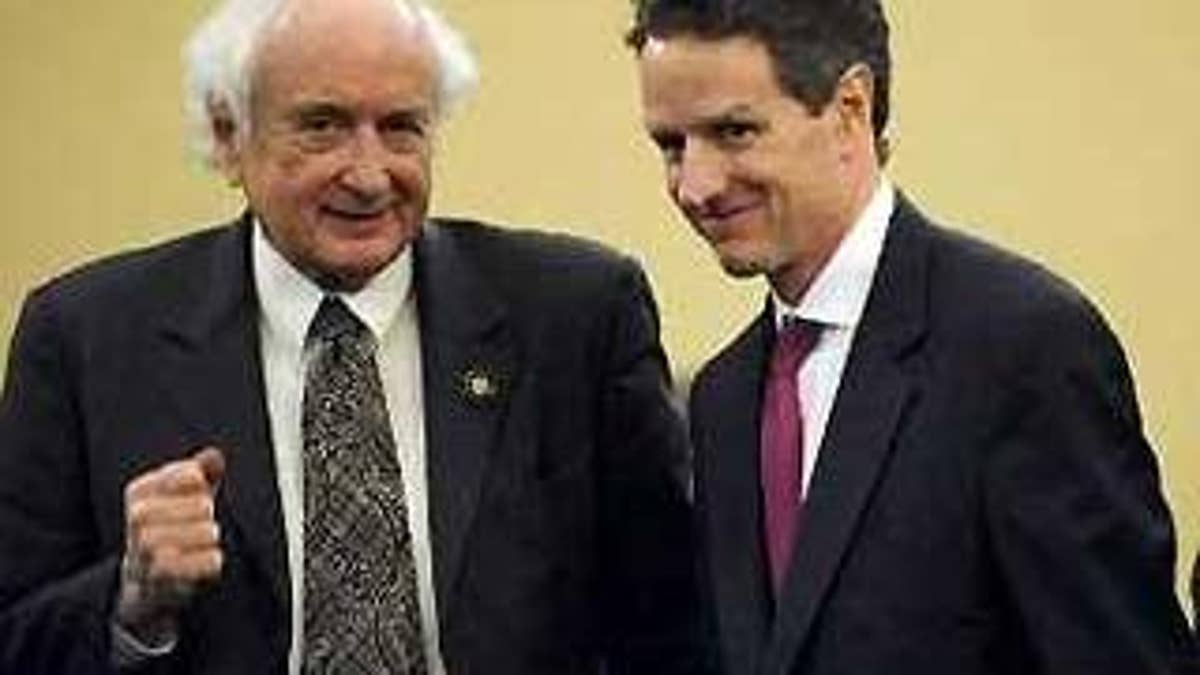
It's been more than a month since Timothy Geithner took the reins as treasury secretary, tasked with doling out stimulus dollars, saving a troubled auto industry and administering President Obama's multibillion-dollar bank bailout program.
So who's helping the secretary navigate the treacherous financial waters?
At the moment, almost no one.
Paul Volcker, head of Obama's Economic Advisory Board, has called the current situation at Treasury "shameful."
"The secretary of the Treasury is sitting there without a deputy, without any undersecretaries, without any, as far as I know, assistant secretaries responsible in substantive areas at a time of very severe crisis." Volcker told a Joint Economic Committee hearing earlier this week.
"[Geithner] shouldn't be sitting there alone," Volcker said.
Adding to Geithner's woes, news broke Thursday evening that the woman rumored to be his choice for deputy secretary, Annette Nazareth, withdrew from consideration after several interviews.
As it turns out, because of the large demand for personnel, it's likely that many of the same folks who lost their jobs in the financial sector after their firms' investments went south -- and were forced to seek U.S. government bailouts -- could be the next administration officials to dole out the cash.
"The need for clear communication between Wall Street and Capitol Hill has never been greater," said Justin Fishkin, strategist at the The Cypress Group, a Washington-based financial services consulting boutique. "Government and private industry increasingly have a need for Washington-based personnel with financial expertise."
Fishkin, who began his career as an investment banker with Goldman Sachs, said many of his former colleagues fit the profile of someone who could be tapped to work at Treasury.
The worldwide economic meltdown is cutting jobs in the financial sector at a rapidly accelerating rate and has forced top U.S. firms like Morgan Stanley, Citigroup and Bank of America to lay off thousands in the last few months alone.
While Geithner faces criticism for not returning the markets back to health fast enough, one private investment adviser who spoke on condition of anonymity told FOXNews.com that the department is overwhelmed.
"I don't even think the Treasury knows what they need yet," the adviser said. "Most people think the government ought to try and contract out a lot of what they're trying to do ... but the administration and the current Congress don't seem to go for outsourcing."
The Office of Personnel Management already lists some 200 Treasury jobs on its Web site, and financial insiders are expecting that number to spike as the administration begins to fill the middle ranks at Treasury and the FDIC.
The top jobs aren't the only ones the department will need to fill. A spokesman at Treasury said officials don't know how many positions will be created, but financial insiders say the department will need to beef up significantly if it hopes to deal with the massive untangling of the country's economic crisis.
Simon Johnson, a professor of entrepreneurship at MIT's Sloan School of Management, said the fact that top level jobs have yet to be filled is amazing, given the advanced state of the economic crisis.
"I'm totally in favor of having financial professionals brought in," Johnson said. "I'm just worried about having people from the big banks, like the risk management people ... the people that are part of the problem."
Andrew Biggs, an economic scholar with the conservative American Enterprise Institute, said the Treasury Department must look for people who combine practical experience in finance plus an academic understanding of economic theory.
"The real problems here were with the government as much as with the private sector, but you don't see Chris Dodd or Barney Frank recusing themselves from orchestrating bailouts just because they played a role in the disaster," Biggs said, referring to the chairmen of the Senate and House banking and financial services committees.
Biggs said it would be stupid to bring in people with less knowledge and fewer skills just because they have the Wall Street tag that is anathema on Main Street these days.
"If a Wall Street guy is the best one for the job, he should get hired -- not for his own good, out of some sense of fairness, but because we simply need the best people for the job," he said.
So could a job in government hold some allure for former Wall Street power players? According to the OPM Web site, some of the benefits include: 10 federal holidays, 13 days of paid vacation for the first three years and public transportation subsidies. The average salary for a mid-level, non-appointed Treasury job is $43, 557 to $68,875.
Federal holidays may be nice, but they're still a far cry from the big bonuses handed out to the once Hamptons-happy financial world. But one of the thousands of recently laid off Bank of America employees says the young, money-hungry bankers aren't going to reject a federally capped paycheck if it means having a job.
"A year ago," the banker said, "I think you would've been hard put to find anyone ready to give up the promise of big paychecks for the opportunity to work as bureaucratic hack.
"Today? Well, let's just say I know a few hundred guys who'd say, sign me up."












































